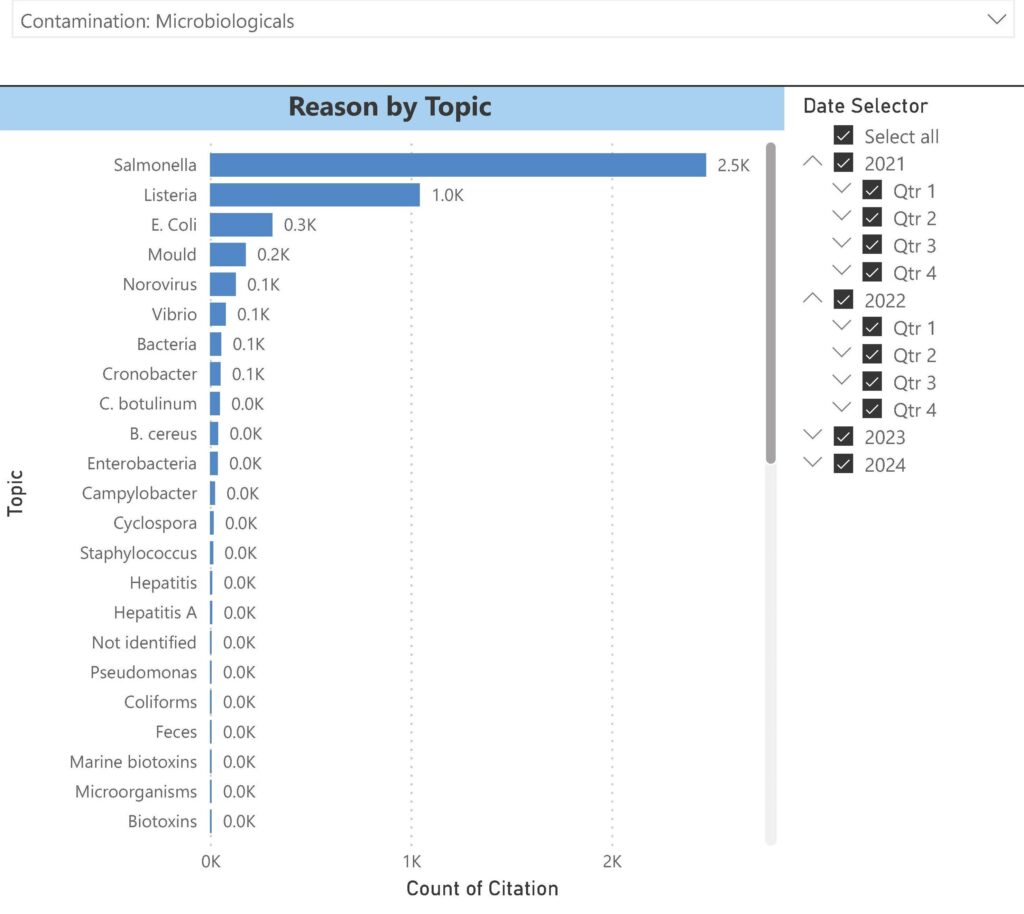By Aslı Tuncer Madge, Regulatory Researcher and Regulatory Trends Consultant
Welcome to the intriguing world of food safety, where every bite comes with its own story. Today, we’re looking at the food recall data and the cause of about one-third of global recalls: microbes.
Subscribe to FoodChain ID’s sources for food safety monitoring:
- Regulatory Trends Reports monitors recalls, withdrawals and outbreaks including product category, reason and type from both official and unofficial sources.
- Ingredient Risk Identification by HorizonScan™ provides daily supply chain monitoring of ingredient and supplier threats for biological, chemical and physical hazards from government sources.
Even as the concern over physical contaminants such as microplastics or chemical contaminants like bisphenols, phthalates and PFAS gain recent headlines, the ongoing health risks posed by microbiological contamination in the food supply requires continued attention. Salmonella, Listeria, E. coli, Campylobacter and Vibrio have been longstanding troublemakers for humans, causing concern for centuries, including hospitalization and even death in severe cases. The US Centers for Disease Control and Prevention (CDC) estimates that Salmonella bacteria leads to around 1.35 million infections annually in the United States, resulting in 26,500 hospitalizations and 420 deaths. The German Federal Office of Consumer Protection and Food Safety (BVL) recently released their annual recall statistics for 2023, shedding light on prevalent issues. According to BVL reports, microbiological contamination accounted for nearly a third of all recall incidents.
Food Safety Data Reveal About One-Third of Recalls Due to Microbiological Contamination
Two sources from FoodChain ID examine the details of recalls and microbiological contamination. According to FoodChain ID’s Food Safety Report, which looks at both official and non-official sources, a total of 5,859 recalls were documented in 2023. Ingredient Risk Identification by HorizonScan, another service available from FoodChain ID that cites government data, reported 5,633 recalls in 2023. Both sources analyze recalls with a comprehensive lens of the origin, providing a thorough understanding of the landscape from two perspectives. Microbiological issues accounted for 27% of the recalls in the Food Safety Report and 33% of recalls in Ingredient Risk Identification by HorizonScan, underscoring the need for persistent vigilance in food safety monitoring of common microbiological contaminants.
Regulatory Trend Reports, Reason for Recall Due to Microbiological Contaminant

Food Recall Prevention for a Safer Food Supply
To ensure food safety along the entire food chain from production to consumption, the WHO supports Member States through various initiatives. Creating a food safety culture within an organization is another crucial step in strengthening food safety systems and decreasing the number of recalls. Organizations should advocate for leaders who shift the culture through daily interactions and behaviors and move from checklist compliance to practical implementation. By prioritizing a food safety culture, food business operators can more effectively mitigate the risk of foodborne illnesses, cross-contamination and undeclared allergen recalls. Simultaneously, they can foster consumer trust and loyalty. In a world where every food bite can tell a story, proactive contaminant monitoring and preventative measures can support a tale of safety, confidence and satisfaction with the food supply.
HorizonScan™ is a registered trademark of Fera Science Ltd.










